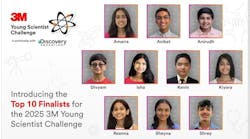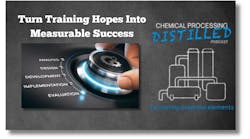Coming up with topics for this monthly column isn’t always easy. Sure, sometimes something leaps out as a good candidate. For instance, a milestone anniversary in September clearly deserved my attention, hence, “Chemical Processing Marks its 80th Anniversary.” However, other times, I struggle to figure out what to focus on.
[pullquote]
Fortunately, I can cover a broad range of topics because a multitude of factors impact the chemical engineering profession and the chemical industry. For example, this year I devoted columns to some technology issues — inadequate research on a key unit operation, distillation, “Funders Fumble Fractionation,” and the best approach for taking advantage of the emerging Industrial Internet of Things (IIoT), “Don’t Be an IdIoT.” I also warned of the possible consequences of a move by the U.S. Government, “Trade Wars Create Collateral Casualties,” and the challenges facing the U.S. Chemical Safety Board (CSB), “CSB Takes On a New Meaning.” In addition, I applauded an innovative approach one chemical company is using to forge relationships with startups working in areas relevant to its business, “Imagine Chemistry Challenge Awards Support to Startups.” In the past, I’ve even used my personal interests as tie-ins for columns, e.g., my love of Studebaker cars, “The Lark Provides a Serious Lesson for the Chemical Industry,” to stress that companies need top-tier executives who will champion chemical technology and production, and my fascination with typewriters, “Typewriters Send a Somber Message,” to point up that lack of skilled technicians and parts can doom otherwise useful equipment at plants.
I marvel at how CP’s technical columnists — all of whom are engineers with extensive experience in industry — come up with good topics month after month given their much narrower mandate. Both Andrew Sloley and Dirk Willard have written their columns (“Plant InSites” and “Field Notes,” respectively) for well over a decade, and have won awards for them. You can access all their columns — which cover good engineering practices; provide pointers on design and operations, including troubleshooting tips; and offer guidance about professional issues.
The roster of potential topics is even narrower for Tom Blackwood, whose every-other-month “Solid Advice” column looks at issues related to handling and processing of powders and other solids.
The focus of our “Energy Saver” column is self-explanatory. Earl Clark, who has been writing that column for two years as of this issue, has decided to step aside. Many of you undoubtedly have found his columns invaluable, and will join me in thanking him for sharing his experiences and insights.
We sought a top-notch replacement — someone with extensive industrial expertise. Jake, the novice engineer featured in many of Earl’s columns, wasn’t an option. Fortunately, we’ve lined up a stellar successor, Alan Rossiter. His long and distinguished career has focused on energy. He is the co-author of the book “Energy Management and Efficiency for the Process Industries.” I expect you’ll find his column, which will start in the January issue, interesting, informative and insightful.
CP’s columnists share a common bond. They feel they should give back to our profession — you are the beneficiary.



